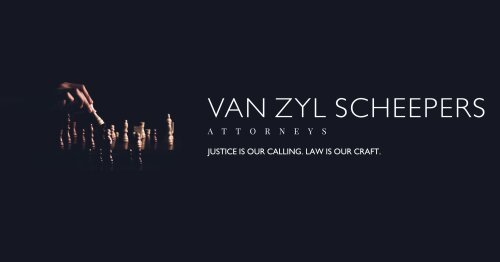Best Banking & Finance Lawyers in Stellenbosch
Share your needs with us, get contacted by law firms.
Free. Takes 2 min.
List of the best lawyers in Stellenbosch, South Africa
About Banking & Finance Law in Stellenbosch, South Africa
Situated in the picturesque Western Cape, Stellenbosch is not only renowned for its viticulture and academic institutions but also as an evolving hub for financial activities. The town has seen a growing presence of financial services, making Banking & Finance law an essential aspect of the local economy. This area of law covers transactions between lenders, borrowers, financial institutions, and the regulations governing them. Given the complexities involved, understanding the nuances of these laws in Stellenbosch is crucial for businesses and individuals alike.
Why You May Need a Lawyer
In the realm of Banking & Finance, there are numerous situations where professional legal assistance may be required:
- Loan Agreements: Reviewing or drafting loan agreements to ensure terms are fair and legally compliant.
- Regulatory Compliance: Ensuring businesses adhere to financial regulations set by the South African Reserve Bank and other local bodies.
- Disputes: Handling disputes related to loans, fraud, or misrepresentation between parties.
- Investment Advice: Assisting with legal aspects of investments, ensuring due diligence, and protecting client interests.
- Corporate Financing: Legal guidance on raising capital through equity or debt, mergers, and acquisitions.
These are just a few instances where the expertise of a specialized lawyer in Banking & Finance is essential to navigate the complexities of the law and protect one's interests.
Local Laws Overview
Stellenbosch, while unique in its setting, is under the jurisdiction of South African national law. Key laws and regulations impacting the Banking & Finance sector include:
- National Credit Act: Oversees the relationship between lenders and borrowers, promoting responsible lending and consumer protection.
- Financial Sector Regulation Act: Establishes the twin peaks model of regulation, enhancing financial stability and consumer protection.
- Banks Act: Governs the establishment and operation of banks, ensuring they maintain adequate capital and adhere to sound practices.
- Consumer Protection Act: While broader in scope, this act also influences financial transactions by enforcing fair contract terms and transparent dealings.
These legal frameworks are enforced by the South African Reserve Bank and the National Credit Regulator, among other entities, ensuring a stable and secure financial environment.
Frequently Asked Questions
What is the role of the National Credit Regulator in South Africa?
The National Credit Regulator is responsible for the regulation of the South African credit industry, ensuring compliance with the National Credit Act, promoting fair and responsible lending, and protecting the consumer.
Do I need a lawyer to secure a business loan?
While it's not mandatory, consulting with a lawyer can ensure the terms of the loan are favorable and legally compliant. A lawyer can help navigate complex agreements and protect your financial interests.
How does the Financial Sector Regulation Act impact consumers?
This Act enhances consumer protections by improving the oversight of financial institutions, ensuring they operate transparently and adhere to fair practice standards.
What constitutes a banking dispute?
Banking disputes can arise from issues such as unauthorized transactions, loan agreement violations, or service discrepancies between banks and customers.
When should I seek legal advice on investments?
It's advisable to seek legal advice before entering any investment transaction. A lawyer can help assess risks, review agreements, and ensure compliance with relevant regulations.
Are all financial institutions regulated by the South African Reserve Bank?
Yes, the South African Reserve Bank supervises all banks and certain financial institutions to ensure stability within the financial system.
What are the consequences of non-compliance with banking laws?
Non-compliance can result in penalties, fines, suspension of business operations, and damage to reputation. Legal advice can help ensure compliance and mitigate these risks.
Can I cancel a loan agreement after signing it?
In some cases, borrowers have a cooling-off period under the National Credit Act, allowing them to cancel the agreement within a specified timeframe. Legal advice is recommended for clarity.
What is the importance of the Consumer Protection Act concerning finance?
The Act ensures that consumers are treated fairly, have access to information, and are protected from unfair business practices, including in financial transactions.
How do I know if my bank is following all regulatory requirements?
Banks are regularly audited and must comply with standards set by the South African Reserve Bank. You can also consult legal services for specific inquiries about compliance.
Additional Resources
For further guidance and support, consider reaching out to the following resources:
- South African Reserve Bank: For regulations and compliance standards.
- National Credit Regulator: Information on credit laws and consumer rights.
- Law Society of South Africa: For finding qualified Banking & Finance lawyers in Stellenbosch.
- Consumer Goods and Services Ombudsman: For disputes involving financial services.
Next Steps
If you need legal assistance in the field of Banking & Finance, start by consulting with a specialized legal professional. Consider reaching out to the local law firms or the Law Society of South Africa to find qualified attorneys in Stellenbosch. Prepare to provide detailed information regarding your situation to receive comprehensive advice. Legal guidance can help ensure that you navigate banking and finance matters effectively and protect your interests in a complex legal landscape.
Lawzana helps you find the best lawyers and law firms in Stellenbosch through a curated and pre-screened list of qualified legal professionals. Our platform offers rankings and detailed profiles of attorneys and law firms, allowing you to compare based on practice areas, including Banking & Finance, experience, and client feedback.
Each profile includes a description of the firm's areas of practice, client reviews, team members and partners, year of establishment, spoken languages, office locations, contact information, social media presence, and any published articles or resources. Most firms on our platform speak English and are experienced in both local and international legal matters.
Get a quote from top-rated law firms in Stellenbosch, South Africa — quickly, securely, and without unnecessary hassle.
Disclaimer:
The information provided on this page is for general informational purposes only and does not constitute legal advice. While we strive to ensure the accuracy and relevance of the content, legal information may change over time, and interpretations of the law can vary. You should always consult with a qualified legal professional for advice specific to your situation.
We disclaim all liability for actions taken or not taken based on the content of this page. If you believe any information is incorrect or outdated, please contact us, and we will review and update it where appropriate.
Browse banking & finance law firms by service in Stellenbosch, South Africa
Stellenbosch, South Africa Attorneys in related practice areas.









